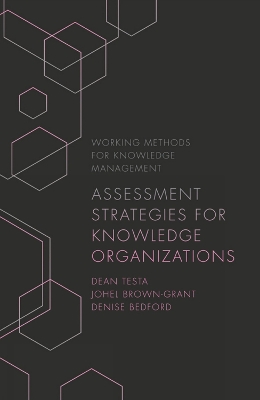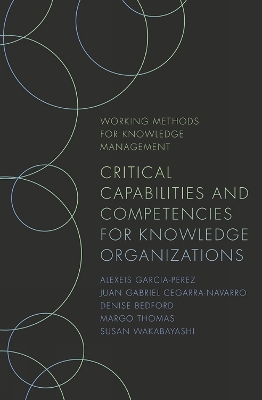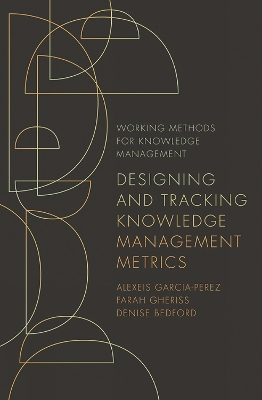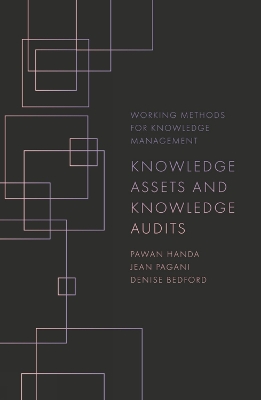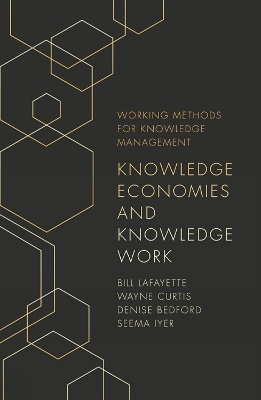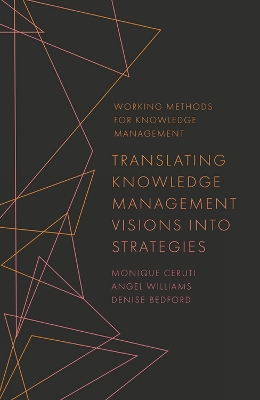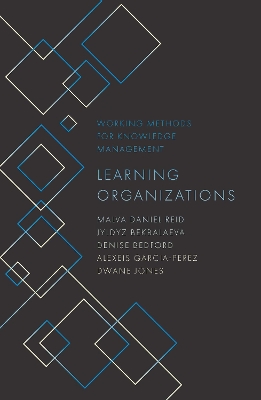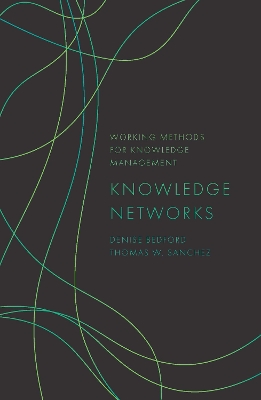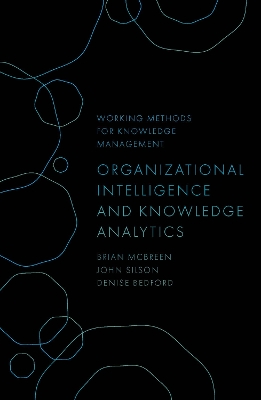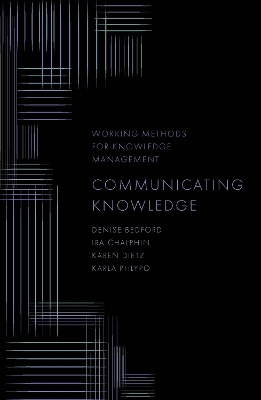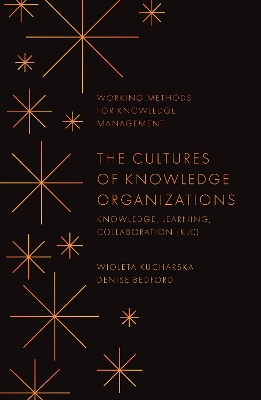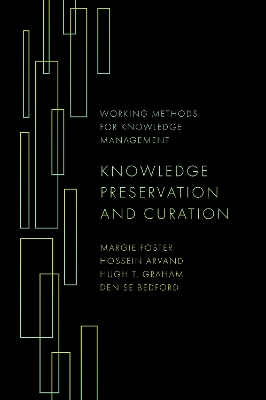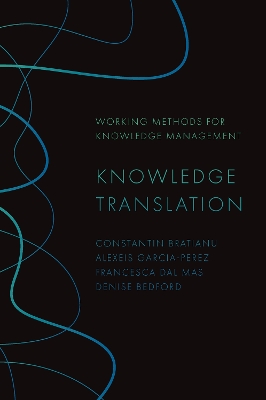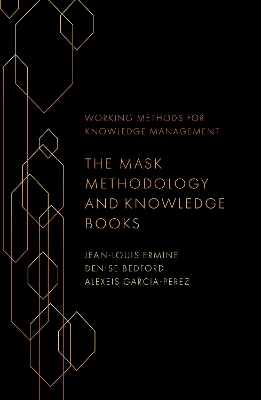Working Methods for Knowledge Management
14 total works
Assessment Strategies for Knowledge Organizations
by Dean Testa, Johel Brown-Grant, and Denise Bedford
Expert authors Dean Testa, Johel Brown-Grant and Denise Bedford draw from their practical and theoretical experience in designing assessments for knowledge organizations, from observing successes and failures in a variety of organizations. Synthesizing their experience, their discussions here help knowledge management professionals gain a deeper understanding of maturity models and determine how best to create an assessment strategy for their organization.
Offering an enhanced understanding of how to engage organisations in assessments, describing maturity factors and offering tools to communicate the results of these maturity assessments, this is an unmissable book for knowledge management professionals and researchers.
Critical Capabilities and Competencies for Knowledge Organizations
by Alexeis Garcia-Perez, Juan Gabriel Cegarra-Navarro, Denise Bedford, Margo Thomas, and Susan Wakabayashi
So how can knowledge management professionals position themselves for greatest success? In this practical guide, expert authors Alexeis Garcia-Perez, Juan Gabriel Cegarra-Navarro, Denise Bedford, Margo Thomas, and Susan Wakabayashi demonstrate how professionals can map knowledge resources to support business critical capabilities, and increase the impact of knowledge management projects. They also explain how to avoid investing in resources with low value, and how to develop strategies and action plans for different types of resources.
Providing practical guidance for professionals, and including mini-case studies of successes and failures, this is an essential book for any knowledge management professional, researcher or student.
Designing and Tracking Knowledge Management Metrics
by Alexeis Garcia-Perez, Farah Gheriss, and Denise Bedford
Addressing this lack, expert authors Alexeis Garcia-Perez, Farah Gheriss and Denise Bedford come together to supply a fundamental discussion of measurement cultures and philosophy, types of metrics, and how to use metrics to grow an organization. They offer a guide for knowledge management professionals to report on progress against goals and targets in terms that are understandable and comparable to their organizational peers, enabling professionals from across businesses to communicate with metrics and engage in wider discussion about the process of achieving organizational visions.
Providing practical guidance for identifying different types of measurements and metrics, as well as methods for defining and collection information about metrics, this is an essential book for knowledge management professionals and researchers on the path to improving metric literacy across their organizations.
Knowledge Assets and Knowledge Audits
by Pawan Handa, Jean Pagani, and Denise Bedford
This exciting guide helps knowledge management professionals gain a basic understanding of assets, investments and audits, so they can command respect from those who are in control of financial investments. It also ensures that organizations have a roadmap for developing short- and long-term investment strategies. Providing guidance for identifying assets - and liabilities - as well as describing the types of investment available to align with knowledge assets, expert authors Pawan Handa, Jean Pagani, and Denise Bedford walk readers through standard audit practices, and help you through the process of designing, conducting, and reporting on the results of a knowledge audit.
For knowledge management professionals, corporate and business leaders and managers, workforce professionals, and educators, this is an unmissable guide that unites the new face of the global economy with accepted auditing practices.
Knowledge Economies and Knowledge Work
by Bill LaFayette, Wayne Curtis, Denise Bedford, and Seema Iyer
A common misconception claims that knowledge work is limited to high-skill and technology occupations. The truth is that this growing field applies across all aspects of the economy, which has critical implications on not only macro-, but also micro-levels. As the nature of work is changing, the functions of managing work must also change, as well as our approaches to education and educational organizations. Through a thorough exploration of the functions and structures required to adapt to this change, as well as a close examination of the geography of knowledge, this first book in the Working Methods for Knowledge Management series helps leaders leverage knowledge to better serve their communities, workplaces, and organizations.
This practical book serves as a guide for corporate leaders and managers, knowledge managers, workforce professionals, policy makers, labor economists, human capital researchers, and educators. It helps diverse audiences understand the implications of this transformation and helps them navigate this new economy.
Translating Knowledge Management Visions into Strategies
by Monique Ceruti, Angel Williams, and Denise Bedford
In the four sections of this book, expert authors Monique Ceruti, Angel Williams and Denise Bedford guide readers through the building blocks of turning knowledge management visions into strategies. They enable professionals to demonstrate their value to the organization's strategic future, as well as empowering readers to take a lead in developing a future vision, and to help establish a foundation for a 21st century knowledge organization.
Providing knowledge management professionals with a roadmap for success within their organizations, this is an unmissable book for any professional or researcher tasked with creating new strategies for knowledge management organizations.
Learning Organizations
by Malva Daniel Reid, Jyldyz Bekbalaeva, Denise Bedford, Alexeis Garcia-Perez, and Dwane Jones
The 21st century economy is fuelled by knowledge. Today, knowledge is more than an idea - it is an economic commodity. An organization's knowledge capital is a competitive and comparative advantage. Every organization must now invest in the knowledge assets of all its employees. Learning is the engine that creates and renews knowledge capital.
Learning Organizations delves into why learning is an essential business operation; how modern learning is different from industrial-era training; how to discover learning sources and opportunities; how to design a learning environment and learning strategies that optimize the potential of every employee.
This is essential reading for business managers, human resource professionals, and academic researchers studying knowledge economies, knowledge, and intellectual capital.
Networks are essential to mobility - mobility of people, goods, services, communications, and knowledge. The 21st century knowledge economy is dependent upon knowledge mobility and flows.
Knowledge networks build upon, but are more complex than, traditional networks. While the network science literature is a starting point, it is not sufficient for modelling or managing knowledge networks. Knowledge networks pay greater attention to nodes as knowledge sources, links as relationships, and the knowledge content of messages. Knowledge Networks describes the role of networks in the knowledge economy, explains network structures and behaviors, walks the reader through the design and setup of knowledge network analyses, and offers a step by step methodology for conducting a knowledge network analysis. Bedford and Sanchez bridge the academic and business perspective of networks. This book illustrates the role of human and non-human actors in these evolving networks, and describes the emerging nature of networks of machines and things.
Knowledge Networks is essential reading for business managers, knowledge managers, network analysts, consultants, and researchers in knowledge transfer and translation.
Organizational Intelligence and Knowledge Analytics
by Brian McBreen, John Silson, and Denise Bedford
Over the past century, intelligence has evolved as a practice in several distinct domains. In each domain, it is a unique set of tactics grown out of day to day practices. Its practice has been limited to functional units in large, well-funded enterprises. However, in the knowledge economy, every organization must behave intelligently. The relationship between knowledge and intelligence is a logical one, but it is not one that has been highlighted in either knowledge management or intelligence analysis.
Organizational Intelligence and Knowledge Analytics expands the traditional intelligence life cycle to a new framework - Design-Analyze-Automate-Accelerate - and clearly lays out the alignments between knowledge capital and intelligence strategies. Explaining what it means to build intelligence capacity across the organization, this book also includes a toolkit of references to analytical methods.
This book is intended for business managers, intelligence professionals, data scientists, competitive and strategic intelligence professionals, and researchers in change management.
Communicating Knowledge
by Denise Bedford, Ira Chalpin, Karen Dietz, and Karla Phlypo
The communication of knowledge is a core concept in the field of knowledge management and an essential new role and responsibility of business managers. Knowledge capital is the primary source of wealth and the key source of productivity in the knowledge economy. Stockpiling and storing knowledge diminishes its value. It is only through circulation that our knowledge capital realizes its business value.
Communicating Knowledge addresses essential management practices in the 21st-century knowledge economy. It speaks to the change that every organization is experiencing as they transition from an industrial to a knowledge organization. The COVID-19 pandemic has heightened an awareness of communications practices in the past year, with communication norms and behaviors being challenged at every level. How we communicate, when we communicate, with whom we communicate, and what we communicate is currently undergoing a global reform. Communication competencies are no longer desirable qualities in managers - they are essential.
This book is intended for business managers working at all levels, knowledge management practitioners and scholars, communications professionals, practitioners, and consultants.
The Cultures of Knowledge Organizations
by Wioleta Kucharska and Denise Bedford
Organizations are increasingly aware of the role that culture plays in implementing strategies. The adage ‘culture eats strategy for breakfast everyday’ shows how important it is to understand, monitor, and calibrate company culture. This means shaping the behaviour of leaders, managers, teams, and individuals. It means integrating assessment and behaviours into performance and communication strategies. Cultures – at all levels – are shifting in today’s society. It is important to understand which factors are having which effects.
The Cultures of Knowledge Organizations presents a new perspective that treats organizational culture not as a static conceptual model but as a dynamic, complex and adaptive system. The authors consider how de facto organizational business cultures must function in a hyperdynamic knowledge economy. Today’s managers need real practical guidance on how to see ‘culture’, how to assess it, how to design a culture that supports business goals, and how to help the workforce understand their own role in shaping culture. This research acts as a map for 21st Century.
Knowledge Preservation and Curation
by Margie Foster, Hossein Arvind, Hugh T. Graham, and Denise Bedford
In order to achieve its full value, knowledge must flow and be continuously used. Knowledge use, reuse, and repurposing has been a challenge discussed in knowledge sciences literature for over three decades. Based on a review of research and conversations with business stakeholders, the authors investigate and offer solutions to two key challenges - preserving and curating knowledge.
Knowledge Preservation and Curation focusses on business value and processes rather than traditional legal and financial requirements, and further, explores preservation and curation in known and unknown business futures. Real-world examples from cutting-edge private and public sector organizations are included, and give unique insight into the world of knowledge management.
Knowledge Translation
by Constantin Bratianu, Alexeis Garcia-Perez, Francesca Dal Mas, and Denise Bedford
Knowledge translation is a topic that originated in the field of health sciences where the need to move research to practice is of critical importance. In parallel, the field of knowledge sciences has developed a research base around knowledge transfer, knowledge sharing, knowledge exchange, knowledge articulation and knowledge absorption. This book brings these two important tracks together and synthesizes the fragmented literatures. It also draws from essential work on human communication and considers how these concepts are affected by the knowledge economy.
The book raises awareness of the critical role that knowledge translation plays in every academic field of study, and in everyday life. To demonstrate this role, the book presents a grounding model that readers can use to better ‘see’ their knowledge translation challenges and opportunities. Drawing on the author team’s experience in a range of domains and sectors, the book explores knowledge translation in the fields of manufacturing, infectious diseases, automated call centers, regulatory development and compliance, financial lending, transportation safety, and doctor-patient discourse.
The Mask Methodology and Knowledge Books
by Jean-Louis Ermine, Denise Bedford, and Alexeis Garcia-Perez
The Mask Methodology and Knowledge Books enables an organization to develop knowledge books, which have proven to be easy to use, easy to store, find and manage, and easy to update as organizational knowledge changes. They have also proven to be highly effective self-study and training resources. Until now, application of the methodology has been limited to Europe – specifically French speaking countries, because the source documentation and in person training materials have not yet been translated to languages other than French.
This compelling new contribution to the field comprises of: A review the types of knowledge capital, and highlight the critical role of tacit knowledge in business operations; an introduction to the economic context for identifying and valuing critical business knowledge; and explanation of the relationship of knowledge engineering to MASK (Method for Analyzing and Structuring Knowledge); a outline of the six models that comprise the MASK model; an explanation of the importance of focusing on expertise that is well recognized by and essential to an organization; instruction on how to design a Knowledge Book for self-study and training; and a guide to building a governance and maintenance process for knowledge books.
